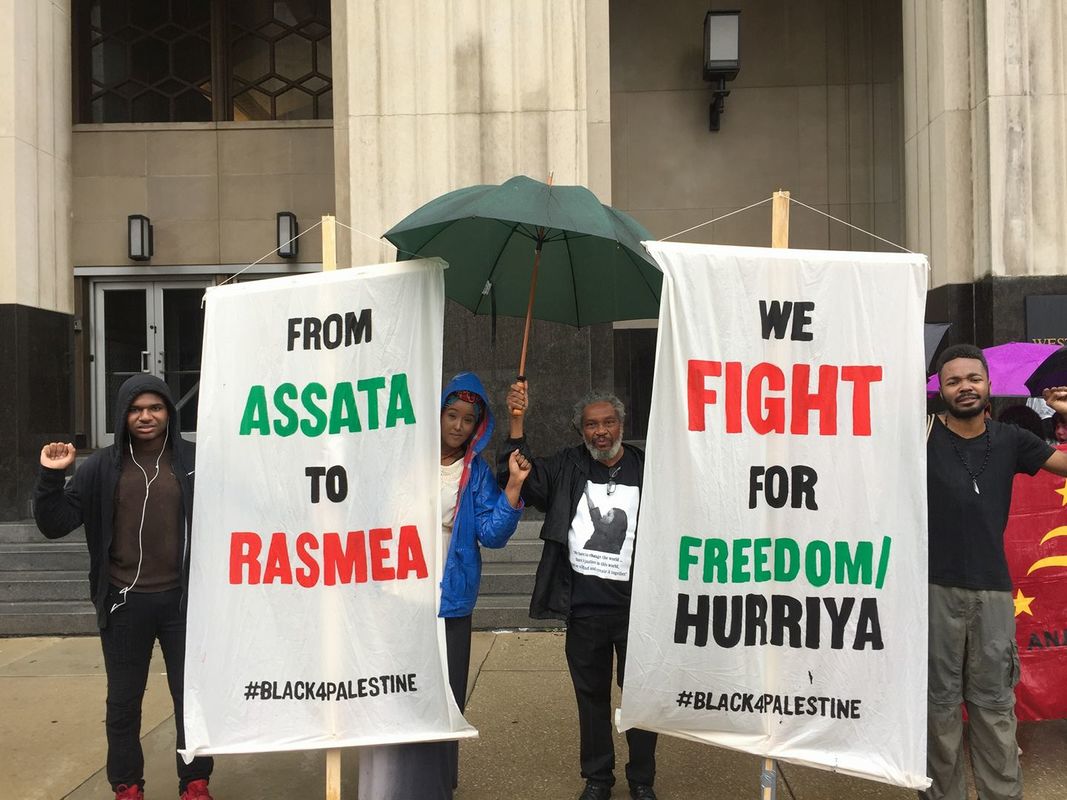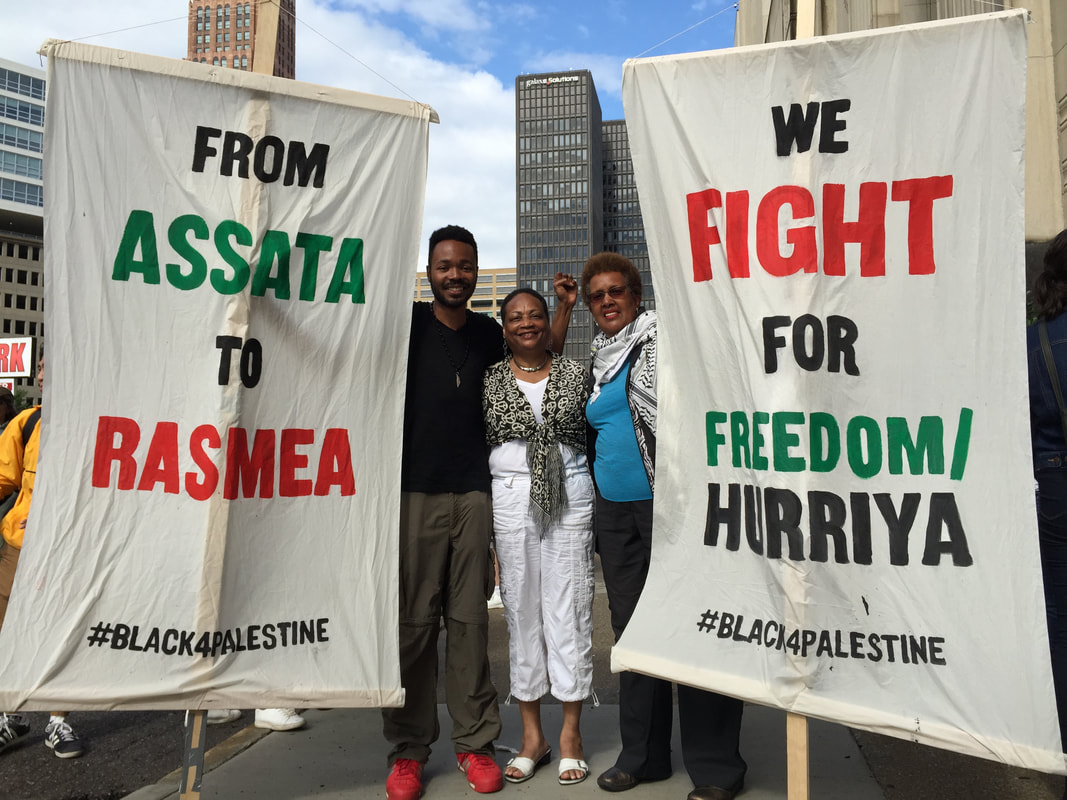|
On Thursday, August 17, 2017 the United States government finalized motions to revoke the citizenship of Palestinian-American activist Rasmea Odeh and to deport her from the country. Black4Palestine member Kristian Davis Bailey was in Detroit for the hearing in solidarity with Rasmea. The following is an adapted version of his remarks at the post-hearing rally:
Full support for Ramsea
Black4Palestine offers our unequivocal and unconditional support for Palestinian-American activist and former political prisoner Rasmea Odeh. Black4Palestine understands that as Black people living in the heart of the US empire, we will not be free until the people who are also under the boot of this empire are free. Today that is our comrades and family the Palestinians. The trial against Rasmea has always been political, but Rasmea's Defense Committee rightly understood that Rasmea would not receive a fair trial under the Trump Administration and the state's response to recent white supremacist violence in Charlottesville illustrates exactly why: No justice on stolen land During the hearing, the judge spoke about punishing “intentional and deliberate false statements.” He said that the United States operates around "truthfulness" and requires punishment for "wrongdoing." Yet when has the United States been "truthful" about its colonial nature or punished for the wrongdoings of genocide, land theft and slavery? How clear are the interests of this country and it’s so called “justice system” that white nationalists and neo-Nazis are not being prosecuted, but a 70-year-old community organizer is being targeted and deported by the “Department of Justice”? How clear are the interests of this country that an entire community's water can be poisoned by the state and no one faces any consequences? How clear are the interests of this country that police can murder thousands of individuals and not face any punishment? There has never been any justice for Native, Black or poor people on this land, so these calls for "justice" expose a fundamental hypocrisy: punishment for the people, but never for the state or the violent practices that hold it up. Attacked for her political organizing The judge claimed this was not a political case, but we all know that it was. We understand that Rasmea is part of a long lineage of political activists who have resisted US empire and Israeli colonialism and were targeted by the state. Two years ago, Angela Davis compared Rasmea's case to her own: “I identify with Rasmea because I know that it is through individuals that entire movements are attacked,” she said. “I knew when I was placed on the FBI’s '10 Most Wanted List' that it would have made no sense to put a single person on that list in that way unless the target was much larger.” At that same event, Angela Davis also compared Rasmea's case to Black revolutionary Assata Shakur, who was liberated from prison by her comrades in the 1970s after facing persecution by the state. She has lived in exile in Cuba since her emancipation.
At Rasmea's farewell event in Chicago, which more than 1,200 people attended, Angela Davis also compared Rasema to Trinidadian-American communist activist Claudia Jones, who was deported by the US in 1955 for her political activities.
Steadfast in the face of repression Regardless of her circumstances, Rasmea has been committed to organizing and committed to the people. She gave 10 years of her life in Israel's brutal and illegitimate jails and then spent more than a decade organizing within Palestinian refugee communities across Lebanon, Syria and Jordan. She even organized during her five weeks in a US prison in 2015. She overcame the divide and conquer efforts of the state to label her a "terrorist" and began to bring the other incarcerated women together. For this "wrongdoing," she was placed into solidarity confinement for three weeks. The hundreds and thousands of people who came together for Rasmea didn't have to physically break her out of jail—but we were able to mobilize for her to be released from solitary confinement, and from an 18-month prison sentence. And because of the power of the people, we were able to make sure that Rasmea does not have to spend any more time in jail. Despite being forced into the "choice" of prison or voluntary deportation, Rasmea refused three times to admit "guilt" during her April hearing. And during her sentencing last week, she refused three times to be silenced by the judge as she named all of the violence Zionists have committed against Palestine. In a country as violent and racist as the United States, Rasmea's refusal to bow in the face of the court inspired us as Black people. Rasmea has continued to embody and teach us the Palestinian practice of "sumud" or steadfastness. A model for joint struggle Rasmea has always demonstrated a commitment to joint struggle. Over the last four years she's brought together a powerful coalition of communities across various backgrounds that are united in our struggle for freedom. Because of her, we have a very powerful community that will continue to organize in Chicago, in Detroit, and in communities around the world. And we know Rasmea will continue to organize wherever she goes. And we know she’ll be welcomed wherever she goes. She might visit South Africa where she’ll be welcomed as a freedom fighter by revolutionary songs and chants. She might visit Europe, where hundreds of thousands of Palestinians live in exile as refugees similar to her and she’ll be welcomed as someone who has given her entire life to her people. She might visit the rural Philippines, where she'll be welcomed as a hero of the people and a comrade of struggling and indigenous people worldwide. Wherever she goes Rasmea will be welcomed because she’s part of the people and fights for the people and the people will always have her in our hearts. The people will never abandon the struggle for Rasmea or the struggle for Palestine. Long Live Palestine! Long Live Rasmea Odeh!
Read Rasema's full statement at the US Palestinian Community Network's website: http://uspcn.org/2017/08/18/rasmeas-statement-at-sentencing/.
|


 RSS Feed
RSS Feed